No products in the basket.
D-mannose
15 Ways To Keep Your Bladder Healthy
Until you experience bladder problems, it is unlikely that you will appreciate just how disruptive they can be to your everyday life. From worrying about going to the toilet to feeling pain and discomfort, having trouble with your bladder is an unpleasant experience. If you’ve had bladder issues like cystitis, which is a type of Urinary Tract Infection (UTI), in the past, then you will certainly recognise the benefits of maintaining a healthy bladder.
The good news is, there are regular habits, activities and lifestyle changes which can help to keep your bladder healthy.
Urinate when you need to and fully empty your bladder
Leaving urine in your bladder for too long increases your chances of getting a bladder infection.
When you need to urinate, you should go to the toilet when required and not hold your urine in. Holding urine within your bladder for a prolonged period can weaken the bladder muscles and increase the likelihood of infection. Ensuring your bladder is fully emptied after urination makes it less likely for bacteria to remain within the bladder and cause cystitis. If you stop urinating too soon before you have fully emptied your bladder by tightening your muscles, this can also cause urine to re-enter the bladder and carry bacteria with it.
Drink plenty of water
You have probably heard that drinking water is good for you. Many studies have linked drinking enough water to a range of both physical and mental health benefits.
Drinking water helps to keep your bladder healthy as it flushes out bacteria within your urinary tract, therefore giving infections fewer opportunities to develop within the bladder. It is important to be sensible and monitor your water intake as you don’t want to be having to go to the toilet constantly throughout the day. The NHS recommends that people drink 6-8 glasses of water per day.
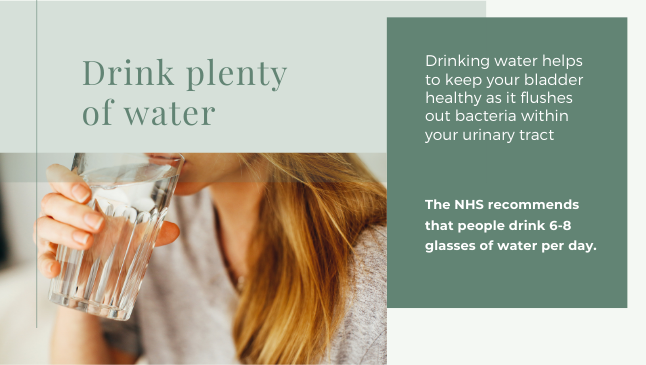
Don’t sit down for too long
This is particularly applicable if you sit down a lot throughout the day, for example if you have a desk job. If you do live a more sedentary lifestyle then you may be more prone to having fluid build-up in your legs. This can cause bladder issues during the night as you may need the toilet on a regular basis.
Sitting all-day can also lead to other bladder issues, particularly if you are male. Potential bladder issues from sitting down too much and not getting enough exercise include needing to urinate more often than usual, urgent urination, not being able to fully empty your bladder and also having a weak urinary stream.
Clean your genitals properly
More women than men get bladder infections. The primary reason for this is that females have a shorter urethra than males and the female urethra is also closer to the anus. The urethra is a vessel responsible for transporting urine from the bladder to an external opening.
Women are advised to wipe from front to back which limits the chance of bacteria like E. coli entering the urinary tract and causing an infection. Sex can also lead to bladder infections so cleaning the genital area before and after sex is also recommended for preventing cystitis.
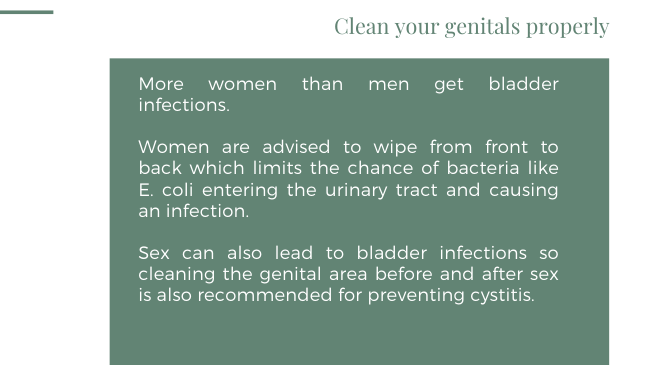
Take stock of what type of foods you are eating
If you are experiencing bladder problems, like having to go to the bathroom more than usual, then your diet could be a factor. Acidic foods including citrus fruits like oranges, lemons and limes, in addition to tomatoes, have been linked to exacerbating bladder related problems. Foods which are high in salt can also lead to bladder problems too.
Excessive levels of sodium intake can result in frequent urination, with the issue being particularly noticeable at night. Varieties of spicy food, such as those containing chilli peppers and other spices can also worsen symptoms if you already have bladder issues
Quit smoking
The negative impact of smoking on your health is well documented. Smoking has been linked to a number of health issues and illnesses. The negative impact which smoking can have on the health of your bladder is less well-known.
You are up to three times more likely to get bladder cancer if you smoke. Tobacco use causes other problems too as it makes you more likely to develop a chronic cough and this can worsen bladder problems by placing more pressure on the bladder which can potentially lead to urinary incontinence.
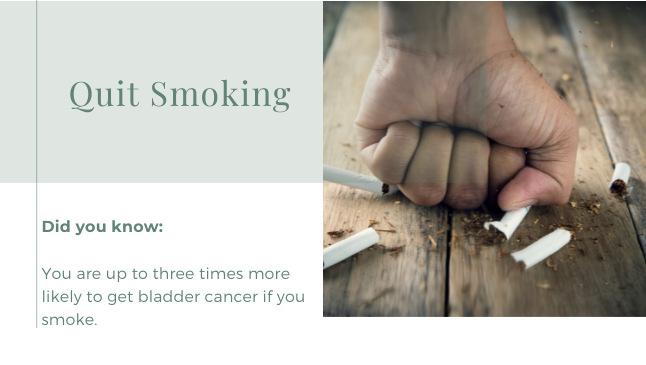
Limit alcohol and caffeine intake
Both alcohol and caffeine are diuretics which mean they cause you to urinate more frequently. A lot of people like a morning coffee or tea and a drink with friends at the weekend, whether that’s a few beers, wine or spirits.
Alcohol and caffeine intake in moderation should not cause any problems but if you feel like you are experiencing issues and are maybe over-doing it on this front then it might be a good idea to scale it back a little bit. Too much alcohol and caffeine can also lead to sleep disruption and other issues.
Take natural supplements like D-mannose
If you suffer from cystitis (bladder infections) then natural supplements could help. Antibiotics are often prescribed for bladder infections, but prolonged use of antibiotics can lead to them becoming less effective. D-mannose is a simple sugar and occurs naturally in certain fruits and vegetables including cranberries, apples, broccoli and green beans.
Research has shown the potential for D-mannose to be effective in the eradication of E. coli bacterium from the bladder, which is the cause of most water infections. D-mannose is natural and can be taken on a regular basis for maintenance purposes. If you are interested in D-mannose, you can choose from both capsule and powder supplements. Cranberry capsules are also chosen by people suffering from bladder infections.

Strengthen your pelvic floor muscles
If you have strong pelvic floor muscles, then you will find it easier to control your bladder. Your pelvic floor muscles help to control the urethra which carries urine from the bladder to the outside of your body. Weak pelvic floor muscles are a more common issue in women. If you have bladder problems and they have been attributed to weak pelvic floor muscles, there are ways in which you can strengthen this area:
- Kegel exercises
These exercises involve squeezing your pelvic floor muscles for three seconds, as if you are preventing yourself from urinating, and then repeating several times with rests of three seconds between each set. You can speak to your doctor about how often you should repeat these exercises.
- Biofeedback
This process involves sensors being placed near the muscles and is used to determine whether or not you are using the correct muscles during your Kegel exercises.
- Vaginal Weights
This is something else which can be used as part of Kegel exercises. You place a weight inside your vagina and perform the exercises with the aim of trying to keep the weight from falling out. As your muscles get stronger you can use heavier weights.
Be careful how much you drink at certain times
Ensuring you drink plenty of water actually helps to promote good bladder health. However, if you struggle with urinary incontinence then it is a good idea to be careful with regards to how much fluid you drink at certain times.
Many people with urinary incontinence have particular problems at night, with sleep being disrupted by the need to get up and go to the bathroom on a regular basis. Therefore, limiting your fluid intake in the hours prior to bedtime is recommended. Likewise, if you know you are going somewhere which might not have easily accessible toilet facilities, you might want to limit your fluid intake beforehand.
Maintain a healthy weight
Eating a balanced diet, getting regular exercise and maintaining a healthy weight are all positive factors which contribute to your overall physical and mental wellbeing.
By maintaining a healthy weight, you can also help to keep your bladder healthy too. Carrying too much excess weight can put added pressure on your abdomen and your bladder and this can result in urine leakage. Although exercise is just one contributing factor of maintaining a healthy weight, people who are more active tend to experience fewer bladder problems than those who live a more sedentary lifestyle.
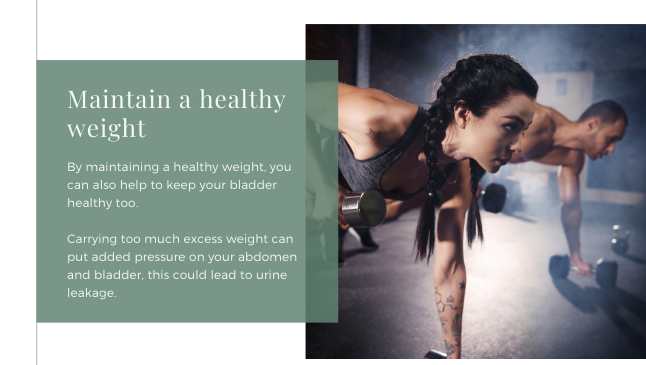
Try to combat constipation
The muscles and nerves which control your bladder are actually closely linked to those which control your bowel movements too. Furthermore, the bladder and colon are situated within close proximity to each other within the human body. Large amount of stool within the colon can actually place pressure on the bladder which can result in the bladder not filling up as much as it should and not contracting when it needs to.
Constipation may even cause the bladder to not empty completely. Ways to combat constipation include exercising regularly, drinking plenty of water and eating foods that are high in fibre, such as, fruit, vegetables, beans and lentils.
Wear cotton underwear
This one is related to women’s bladder health. Cotton is the best underwear material if you’re a woman looking to prevent bladder problems. Cotton is both highly breathable and absorbent, whereas underwear made from lycra and other synthetic materials like spandex and nylon trap both heat and moisture, providing bacteria with the perfect environment in which to thrive and potentially cause a UTI.
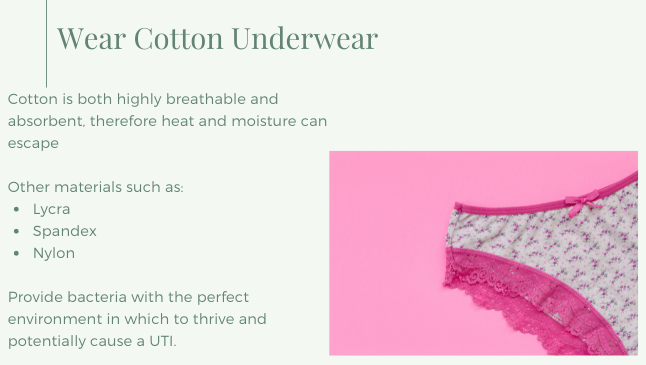
Manage the medication you are on
Different types of medication can contribute to bladder problems, so it is important that you assess and manage the medication you are taking if you are experiencing issues.
Drugs for high blood pressure, antihistamines, sedatives and antidepressants have been related to bladder issues. The best thing to do is talk with your doctor if you believe that your medication is causing bladder problems or making your current bladder issues worse.
Visit your doctor if bladder problems persist
If you are following many of the recommendations above but are still experiencing bladder problems, then you should visit your doctor. There is a good chance your doctor will identify the issue(s) and provide you with a tailored plan to promote your bladder health in the future.

References
https://www.everydayhealth.com/bladder-health-pictures/keep-your-bladder-healthy.aspx
https://www.healthline.com/health/bladder-control#treatment-plan
